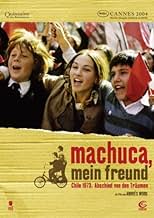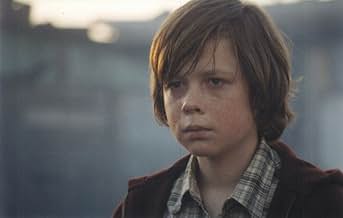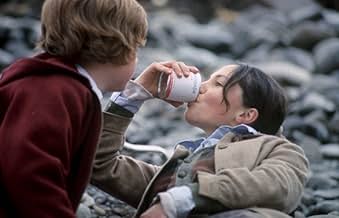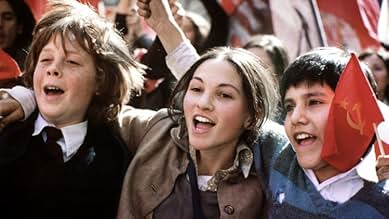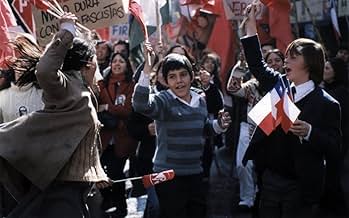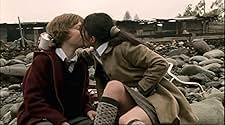VALUTAZIONE IMDb
7,7/10
12.955
LA TUA VALUTAZIONE
Nel 1973, due dodicenni cileni di diversa estrazione sociale stringono amicizia. Ognuno scopre il mondo dell'altro, man mano che le tensioni politiche nel loro paese aumentano.Nel 1973, due dodicenni cileni di diversa estrazione sociale stringono amicizia. Ognuno scopre il mondo dell'altro, man mano che le tensioni politiche nel loro paese aumentano.Nel 1973, due dodicenni cileni di diversa estrazione sociale stringono amicizia. Ognuno scopre il mondo dell'altro, man mano che le tensioni politiche nel loro paese aumentano.
- Regia
- Sceneggiatura
- Star
- Premi
- 13 vittorie e 8 candidature totali
Aline Küppenheim
- María Luisa Infante
- (as Aline Kuppenheim)
Daniel Alcaíno
- Sargento Ejército
- (as Daniel Alcaino)
Recensioni in evidenza
I live in Chile, where the movie happens. I have also followed Andres Wood in his career as a Director and I must say that this is his most mature, rounded and strong piece of work.
The Movie is centered in the social phenomena that happened in the last days before the Coup in 1973. Now the movie is incredibly accurate from the Costume Design, the Cars's License Plates, the expressions, the product brands and graffitis, to the social polarization, violence and killings. As remarkable as the Production is the honesty of the director, who could have easily fall into contaminating his movie with political propaganda, instead he kept delightfully accurate.
Even though for those who knows the history, the devastating feeling is all around, the movie centers in the social experiment led by a priest who was the principal of a high class school, who takes into the school some poor mestizo children.
Machuca is one of this children's who begins a friendship with a white rich children.
The story itself works as a metaphor for the innocence of the people in that time. innocence that was lost over and over.
The Movie is centered in the social phenomena that happened in the last days before the Coup in 1973. Now the movie is incredibly accurate from the Costume Design, the Cars's License Plates, the expressions, the product brands and graffitis, to the social polarization, violence and killings. As remarkable as the Production is the honesty of the director, who could have easily fall into contaminating his movie with political propaganda, instead he kept delightfully accurate.
Even though for those who knows the history, the devastating feeling is all around, the movie centers in the social experiment led by a priest who was the principal of a high class school, who takes into the school some poor mestizo children.
Machuca is one of this children's who begins a friendship with a white rich children.
The story itself works as a metaphor for the innocence of the people in that time. innocence that was lost over and over.
Although i was not old enough to live through these events, its repercussions are still felt today. Its interesting to see this movie in the theater and hear older people in the audience booing and cheering at the different scenes and historical characters in the movie, meaning that it accurately depicts the events. The movie is excellent in the way it portrays the everyday life experienced back in those days. The movie is apolitical in the way the main characters are children, so the focus is everyday life more than taking an actual view. The great special effects used, increase the realism and makes the movie so much better, and you don't even notice they are being used.
I recommend this movie 100% both to Chileans, and foreigners that want a glimpse on the life of the upper/middle classes in Chile back in 1973.
I recommend this movie 100% both to Chileans, and foreigners that want a glimpse on the life of the upper/middle classes in Chile back in 1973.
10dsalvat1
This movie tells a tale on the eve of the darkest hour in Chileann history, where two boys of different social background become friends.
This is a very powerful film, especially for Chileanns and many Latin Americans that suffer the prejudice of classicism (the racism of Latin America) and their ideals being beaten away from them.
You will notice many resentments and insults on this message board as the film gets more exposure due to the fact that some people still live in the past.
I hope this film brings everybody together and shows that no matter what race, religion, sexual orientation or social class, children do not discriminate, everybody feels the same emotions.
Hate is learned by the actions of role models.
This is a very powerful film, especially for Chileanns and many Latin Americans that suffer the prejudice of classicism (the racism of Latin America) and their ideals being beaten away from them.
You will notice many resentments and insults on this message board as the film gets more exposure due to the fact that some people still live in the past.
I hope this film brings everybody together and shows that no matter what race, religion, sexual orientation or social class, children do not discriminate, everybody feels the same emotions.
Hate is learned by the actions of role models.
This is an absolutely wonderful film that captures a very interesting period of history told as a coming-of-age tale from the perspective of three pubescent school children. Like "Diaros de Motocicleta", the recent film about a young Ernesto Guevara, this is NOT simply a political diatribe. It does not romanticize the Allende government or the difficulties (riots, shortages, etc.)that the country went through during his turbulent reign. It certainly doesn't paint the Pinochet coup in a very favorable light, but I don't see how you can make the overthrow of a democratically-elected government and the murder, torture, and disappearance of some 3,000 people look like a wonderful thing. The film portrays many Pinochet supporters either as rich and corrupt or as small-minded, reactionary bullies (which is not entirely inaccurate), but it certainly doesn't shy away from the dark side of the Allende revolution( Allende supporters are shown accosting middle-class Chileans in the street, Allende himself appears in actual TV footage of his notorious meeting with Soviet leader Leonid Breshnev). Really though it would be a shame if continuing political differences stop people from seeing this superb film which really transcends politics to capture the spirit of youth and a time that, as terrible as it was, will never be forgotten.
In 1973, the Chilean military, under the direction of General Augusto Pinochet and backed by the CIA, overthrew the shaky socialist government of democratically elected President Salvador Allende. The coup led to the murder of 3,000 leftist Allende supporters and the detention of an estimated 250,000 political prisoners. Set against the background of the political instability that led to the crisis, Andrés Woods' Machuca is the moving story of the friendship between two boys from different sides of the social spectrum. Voted the most popular film at the 2004 Vancouver Film Festival and a major box-office hit in Chile, the semi-autobiographical film succeeds on both a human and a political level, the different elements coming together in a final conflagration.
Gonzalo Infante (Matias Quer) is a chubby, red-faced 11-year old who attends St. Patrick's private school. He lives in a wealthy neighborhood where his security is unquestioned, even though he knows that his mother Maria (Aline Kuppenheim) is having a long-standing affair with a well-to-do Argentine businessman. Gonzalo is shy and inexpressive and is often bullied at school. His life changes, however, when Father McEnroe (Ernesto Malbran), the priest who runs the school, opens St. Patrick's to those who are unable to pay, and Gonzalo develops a friendship with Pedro Machuca (Ariel Mataluna), a youngster who lives in a nearby shantytown. The inclusion of the marginal students causes unrest at the school. Fights break out between the two economic classes and parents hastily call meetings to voice their opposition to the "communist" priest. Gonzalo protects Pedro from the bullies and later visits Pedro in his home.
Aware of how much he has, Gonzalo accepts his status without feeling superior, though Pedro's family refers to him as "the snob". In a subplot, Pedro's seductive young cousin Silvana (Manuela Martelli) gives both boys an introduction to sexual pleasure. Though the relationship between the two boys develops naturally and their innocence allows them to see past the developing turmoil, the disturbing layers of adult events slowly begin to threaten their friendship. To pick up some extra money, the boys attend political rallies and sell Chilean flags to both the Nationalists and the Communists, but soon emotions escalate and street fights break out between far-left and far-right militants. The onset of revolt is signaled by the arrival of two jets flying towards the Presidential Palace, a seminal event in Chile's history that marked the end of their democracy.
One of Chile's most successful young filmmakers, Woods lets the facts speak for themselves, and Machuca makes its points with an emotional power unencumbered by bias or simplistic messages. While the upper middle class is shown as elitist and disdainful of the working class, Pedro's family is also not portrayed in glowing terms. In a drunken rage of victimization, the father tells his son that in a few years, "He (Gonzalo) will be working for Daddy....You'll be cleaning toilets." The children are portrayed as simply children without the false glow of larger-than-life heroism. Although Machuca may ultimately have more of an impact for Chileans who experienced the coup directly, its theme of young people caught in the swirl of events beyond their understanding resonates far beyond the details of this single tragic moment in history.
Gonzalo Infante (Matias Quer) is a chubby, red-faced 11-year old who attends St. Patrick's private school. He lives in a wealthy neighborhood where his security is unquestioned, even though he knows that his mother Maria (Aline Kuppenheim) is having a long-standing affair with a well-to-do Argentine businessman. Gonzalo is shy and inexpressive and is often bullied at school. His life changes, however, when Father McEnroe (Ernesto Malbran), the priest who runs the school, opens St. Patrick's to those who are unable to pay, and Gonzalo develops a friendship with Pedro Machuca (Ariel Mataluna), a youngster who lives in a nearby shantytown. The inclusion of the marginal students causes unrest at the school. Fights break out between the two economic classes and parents hastily call meetings to voice their opposition to the "communist" priest. Gonzalo protects Pedro from the bullies and later visits Pedro in his home.
Aware of how much he has, Gonzalo accepts his status without feeling superior, though Pedro's family refers to him as "the snob". In a subplot, Pedro's seductive young cousin Silvana (Manuela Martelli) gives both boys an introduction to sexual pleasure. Though the relationship between the two boys develops naturally and their innocence allows them to see past the developing turmoil, the disturbing layers of adult events slowly begin to threaten their friendship. To pick up some extra money, the boys attend political rallies and sell Chilean flags to both the Nationalists and the Communists, but soon emotions escalate and street fights break out between far-left and far-right militants. The onset of revolt is signaled by the arrival of two jets flying towards the Presidential Palace, a seminal event in Chile's history that marked the end of their democracy.
One of Chile's most successful young filmmakers, Woods lets the facts speak for themselves, and Machuca makes its points with an emotional power unencumbered by bias or simplistic messages. While the upper middle class is shown as elitist and disdainful of the working class, Pedro's family is also not portrayed in glowing terms. In a drunken rage of victimization, the father tells his son that in a few years, "He (Gonzalo) will be working for Daddy....You'll be cleaning toilets." The children are portrayed as simply children without the false glow of larger-than-life heroism. Although Machuca may ultimately have more of an impact for Chileans who experienced the coup directly, its theme of young people caught in the swirl of events beyond their understanding resonates far beyond the details of this single tragic moment in history.
Lo sapevi?
- QuizAs stated by the director in several interviews, the movie was shot only on Sundays, due to its small budget.
- BlooperSilvana is standing by the outhouse, then moments later, after camera pans, appears on the other side of Gonzalo.
- Citazioni
Patricio Infante: Socialism might be better for Chile but not for us.
- Curiosità sui creditiIn the credits at the beginning of the film, the last letter of each word drifts slowly to the right separating from the names
- ConnessioniFeatured in Sin maquillaje: Tamara Acosta (2013)
- Colonne sonoreAi Amor
Written and performed by Buddy Richard
I più visti
Accedi per valutare e creare un elenco di titoli salvati per ottenere consigli personalizzati
- How long is Machuca?Powered by Alexa
Dettagli
- Data di uscita
- Paesi di origine
- Sito ufficiale
- Lingue
- Celebre anche come
- Мачука
- Luoghi delle riprese
- Aziende produttrici
- Vedi altri crediti dell’azienda su IMDbPro
Botteghino
- Budget
- 1.500.000 USD (previsto)
- Lordo Stati Uniti e Canada
- 26.676 USD
- Fine settimana di apertura Stati Uniti e Canada
- 4635 USD
- 23 gen 2005
- Lordo in tutto il mondo
- 3.187.700 USD
- Tempo di esecuzione1 ora 56 minuti
- Colore
- Mix di suoni
- Proporzioni
- 1.85 : 1
Contribuisci a questa pagina
Suggerisci una modifica o aggiungi i contenuti mancanti



